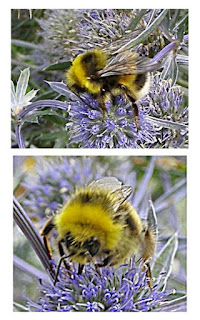
 Photos-Native species of bumblebees.
Photos-Native species of bumblebees.THE UK CURRENTLY HAS 24 BUMBLEBEE SPECIES, BUT SYNGENTA ARE BREEDING THEIR OWN FACTORY-FARMED BUMBLEBEES. . WHY?
U-turns.
Defra and the agri-chem industries are doing a few u-turns on some of their major agricultural strategies. This is since damage to UK topsoil and to the health and survival of our crop pollinators, honeybees and bumblebees has become critical.Having spent the last two years aggressively promoting huge agreages of monocrops and pesticide application, and destruction of field margins and set-aside land and hedges, this process is now having to be reversed. Environmentalists and ecologists warned that destroying natural habitat and topsoil was unsustainable, but the drive for company profits and economic growth is a short sighted affair. Anyway, in acknowledgement of the diminishing numbers of honeybees, bumblebees and other pollinators, Syngenta have have been making 'Green' noises;.....
Operation Pollinator
Geoff Coates, agribusiness manager for Syngenta UK has described its project "Operation Pollinator". which aims to see 10,000 hectares of bee-friendly wildflower and grass and pollen mixes planted across the EU. This research project (formerly called 'Operation Bumblebee'), was carried out by the company in 2005-2008, trialling the use of the mixes alongside commercially grown crops, in field margins and difficult corners etc. This news is puzzling because the project was happening whilst Syngenta et al were driving forward the destruction of field margins and set-aside land across Britain and Europe, in 2007-2009. Perhaps Syngenta hopes that 'operation Pollinator' will detract from the pesticides link with pollinator die offs? Pesticides are now generally cited as the major factor contributing to bee decline, but Defra-employed scientists at University departments and chemical companies are claiming that pesticides are a side issue, and the pesticide link is being neglected by government research departments.(see my previous post)
Factory farmed bumblebees.
But fear not, Syngenta has another money-making wheeze! Biotech companies through a subsidiary Syngenta Bioline,are part of a multi-million dollar industry breeding bees in captivity."Syngenta Bioline are dedicated to the production of premium quality bumblebees ...for use in vegetables, fruit, flowers and ornamental crops," claims the website.
On the face of it this might seem like a good idea but there are significant risks.Tom Levitt, in The Ecologist, has described the doubts which some scientists and environmentalists have about the vested interests of the agri-chemical companies in directing research:-
"Native threat"
"Pollination experts have identified three main risks. If the factory-farmed bees are better at food collecting they can out-compete local bees and establish themselves as a dominant species. They can also inter-breed and gradually dilute native gene-pools.
But most significantly, they can act as a vector for diseases by the shared use of flowers to collect pollen.
But most significantly, they can act as a vector for diseases by the shared use of flowers to collect pollen.
The manufacturers say the bees are used in polytunnel production systems for soft fruits and vegetables like strawberries and peppers, and as such are only ever released into an enclosed area.
However, ecologist and pollinator expert Dr Claire Carvell from the Centre for Ecology and Hydrology (CEH), says studies from the UK, Canada and Japan have shown that even in these circumstances bees do escape and mix with the native population........
..........Helping wild bees
Some argue that the very presence of a bee-breeding industry indicates a misguided focus away from increasing the native, wild bee population, and towards selling a product.
We don't know whether the pollination service works or whether it is just clever marketing.,' says Dr Darvill.(Director of the Bumblebee Conservation Trust)
'It may be that just looking after your hedgerows will bring you more native bees and instead of relying on a factory to produce your bees. Getting a wild pollination service from a synthetic pollinator seems very odd.'......( From 'Agri-chemical companies are both breeding and killing bees.' Tom Levitt,13th october,2009. The Ecologist)
For anyone who doesn't know too much about bumblebees, it's well worth doing a teeny bit of your own research just to see what we'd be losing if our native bumblebees were wiped out. In 2007 the Bumblebee Conservation Trust(http://www.bumblebeeconservationtrust.co.uk/) carried out a survey from the records kept by people in the UK. I was hooked. That summer was a good one for bumblebee numbers, and after a few months I'd seen at least ten species in about one square mile. Some of the photos I took are at top of the page.
It's mad to blithely think we can successfully swap Syngenta's 'super bees' for our evolved native bumblebees, and what sane person would want to.
1 comment:
Good information as ever Blatch. Been following the Copenhagen debacle? I've put an end-of-year post on it up at my blog, drop on by!
Post a Comment